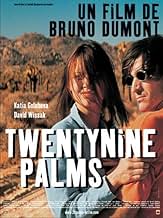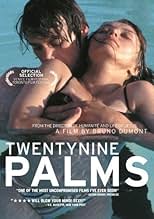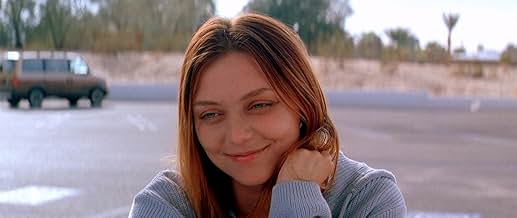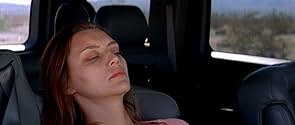IMDb-BEWERTUNG
5,1/10
5334
IHRE BEWERTUNG
Füge eine Handlung in deiner Sprache hinzuDavid, an American photographer, and his Russian girlfriend Katia are scouting locations for a photo shoot. During the day, they drive through some of the wildest, most bizarre desert landsc... Alles lesenDavid, an American photographer, and his Russian girlfriend Katia are scouting locations for a photo shoot. During the day, they drive through some of the wildest, most bizarre desert landscapes, but their luck begins to run out.David, an American photographer, and his Russian girlfriend Katia are scouting locations for a photo shoot. During the day, they drive through some of the wildest, most bizarre desert landscapes, but their luck begins to run out.
- Regie
- Drehbuch
- Hauptbesetzung
- Auszeichnungen
- 1 Gewinn & 2 Nominierungen insgesamt
Yekaterina Golubeva
- Katia
- (as Katia Golubeva)
Empfohlene Bewertungen
10ik-12
This seems to be a serious film, although it's easy to misunderstand it or to be appalled by it. Scenes of "animalistic" sex with almost no conversation or foreplay, scenes of horrific violence, hardly any plot -- all that might be a total turn-off for many.
I was lucky to attend a Q&A session with the director, where he answered a lot of questions. The idea for this film was born when Dumont was in California desert, and, as he puts it, "I was afraid". It seems the time and space and the silence and the power of it all influenced him very much. Among other things, he addressed the audience before the film started, with "if you become afraid when you watch this film, just cover your face with hands".
He also stated later that the film is an experiemnt at expressing his feelings, and has no intent, or narrative, or message. The director is free to express himself, and the spectator is free to see whatever (s)he may in the film and take that away. The characters are stripped of anything that would make them likeable or dislikeable, and generally of anything but the very primitive in order to make the experience pure.
The characters are not the focus of the film; sound and background are. "Untreated" location sound was used throughout the film and is very important for the director to convey the sense of the place and time. In one scene one could even hear the sound of lighting generator behind the camera, which Dumont refused to edit out during the argument with the sound crew. Camerawork is also original and important in this experience.
The serenity of transcendent scenes remind me of Zabriskie Point. Using explicit sex and violence remind me of Irreversible and I Stand Alone. Yet, this is certainly not a "following", this is a highly personal expression, which is designed to generate a highly personal experience for any viewer.
Altogether NOT recommended if one is looking for "normal" filmgoing experience.
I was lucky to attend a Q&A session with the director, where he answered a lot of questions. The idea for this film was born when Dumont was in California desert, and, as he puts it, "I was afraid". It seems the time and space and the silence and the power of it all influenced him very much. Among other things, he addressed the audience before the film started, with "if you become afraid when you watch this film, just cover your face with hands".
He also stated later that the film is an experiemnt at expressing his feelings, and has no intent, or narrative, or message. The director is free to express himself, and the spectator is free to see whatever (s)he may in the film and take that away. The characters are stripped of anything that would make them likeable or dislikeable, and generally of anything but the very primitive in order to make the experience pure.
The characters are not the focus of the film; sound and background are. "Untreated" location sound was used throughout the film and is very important for the director to convey the sense of the place and time. In one scene one could even hear the sound of lighting generator behind the camera, which Dumont refused to edit out during the argument with the sound crew. Camerawork is also original and important in this experience.
The serenity of transcendent scenes remind me of Zabriskie Point. Using explicit sex and violence remind me of Irreversible and I Stand Alone. Yet, this is certainly not a "following", this is a highly personal expression, which is designed to generate a highly personal experience for any viewer.
Altogether NOT recommended if one is looking for "normal" filmgoing experience.
This is one of those films where "nothing happens", where the frame stands as a window into the world of tedium. It's contrasted against this humming nothingness, mirrored in the film in the empty stretches of desert, that the small gestures can reverberate outwards to the eternal, to give us a portrait of life as we might know it by our own existence, elsewhere, in some other time.
These fleeting human moments, painful or exhilarating in their small profundity, largely make the film for me. A man stealing a glance at a passing girl in a diner, glance which may or may not be casual or mean something else, and which makes the woman sulk in jealous consternation. The woman trying to penetrate the hard, unyielding, demeanor of the man, asking him as he drives what is he thinking, the man saying nothing. The irritable tantrum of the man when their car won't go any further in a dirt road, that reveals the male child inside, petulant and impotent at the sight of failure.
Elsewhere Dumont fails to cut as incisively. The contrast he gives us in the first pool scene, "do you love me?", "do you like my penis?", is simpleminded at best.
The film works despite all that, first as a tangible reminder of the meaninglessnes of craving, here in the form of carnal animal sex that needs to be consumated, almost exorcised, the moment it builds. The nothingness of Dumont's desert world is not the shunyata of the Buddhists though, a realization of the world in true form. Rather it's a limbo where souls in disconnect aimlessly drag their feet yearning for a sense of direction or purpose when the only sense possible is a sense of still time. This shines for me in the latenight scene where David finds Katia sitting by herself at the side of the macadam, they seem like they're washed ashore in some other plain of existence. A pall of simmering, unspeakable, violence hangs over this like the shifting rents of dust in a dirt road, so that at least a breaking point can be surmised to be waiting at the other end.
Then it works for me as a painful vehicle that brings us at the brink of the existential void. I'm not very enamored of the act of random cruelty that makes this possible, the randomness makes sense yet at the same time it's so easy as to be schematic, but the monster that emerges on the other end is a shocking sight to me because I have the memory of the flawed human being that used to be.
The dysfunction of the protagonists then, foremostly human, also foreshadows doom. That malaise we see but small traces of in their behavior must exist out there too, in the rest of the world that is largely kept from our eyes.
Dumont doesn't dare go any further than this, that is if we accept there is somewhere to go, but as an agnostic lament it goes far enough.
These fleeting human moments, painful or exhilarating in their small profundity, largely make the film for me. A man stealing a glance at a passing girl in a diner, glance which may or may not be casual or mean something else, and which makes the woman sulk in jealous consternation. The woman trying to penetrate the hard, unyielding, demeanor of the man, asking him as he drives what is he thinking, the man saying nothing. The irritable tantrum of the man when their car won't go any further in a dirt road, that reveals the male child inside, petulant and impotent at the sight of failure.
Elsewhere Dumont fails to cut as incisively. The contrast he gives us in the first pool scene, "do you love me?", "do you like my penis?", is simpleminded at best.
The film works despite all that, first as a tangible reminder of the meaninglessnes of craving, here in the form of carnal animal sex that needs to be consumated, almost exorcised, the moment it builds. The nothingness of Dumont's desert world is not the shunyata of the Buddhists though, a realization of the world in true form. Rather it's a limbo where souls in disconnect aimlessly drag their feet yearning for a sense of direction or purpose when the only sense possible is a sense of still time. This shines for me in the latenight scene where David finds Katia sitting by herself at the side of the macadam, they seem like they're washed ashore in some other plain of existence. A pall of simmering, unspeakable, violence hangs over this like the shifting rents of dust in a dirt road, so that at least a breaking point can be surmised to be waiting at the other end.
Then it works for me as a painful vehicle that brings us at the brink of the existential void. I'm not very enamored of the act of random cruelty that makes this possible, the randomness makes sense yet at the same time it's so easy as to be schematic, but the monster that emerges on the other end is a shocking sight to me because I have the memory of the flawed human being that used to be.
The dysfunction of the protagonists then, foremostly human, also foreshadows doom. That malaise we see but small traces of in their behavior must exist out there too, in the rest of the world that is largely kept from our eyes.
Dumont doesn't dare go any further than this, that is if we accept there is somewhere to go, but as an agnostic lament it goes far enough.
This film is perhaps one of the most disconcerting and original film to discuss the potential for dislocation and horror that lies in all male-female sexual relationships. In the manner of one of the best modernist road movies (Two Lane Black Top), it strips all the unnecessary and hackneyed elements of narrative (e.g. standard horror or romance "tropes" often employed in the couple road movie) and both transcends the level of most other films, and simultaneously creates a far more convincing and natural reality through its controlled pacing, lack of narrative contrivance, its central performances and its perfectly composed photography.
As usual, Dumont's psycho-philosophical concerns are the ultimate "point" of the film, and it is essential that these are at least partially understood in order to appreciate the film. Some of these, once again, are notions (I believe) about the essentially selfish, violent "animal" nature of the way most humans think, particularly men, and the way this explains the insatiable human appetite to murder and screw. The final link that is made between horrific random brutality and the central man's sexuality is thereby horribly significant, and in no way simply an attempt to shock an audience simply for the sake of shocking an audience. A shock is of course intended, but to make an interesting point that challenges a complacently liberal optimist view of human nature/behaviour. It also provides a perfectly significant and unpleasant climax to Dumont's uneasy journey into the amorality and horror of male-female relations and human behaviour.
It's disheartening and yet inevitable that this film is not generally recognised as a brilliant piece of work. Whereas Bresson is now recognised as a master, Dumont is a new master and many of the comments here reflect the fact that his work has been predictably misunderstood. Many people display an obvious and almost deliberate confusion at his method and his choices, not being prepared to do any work to engage with the film or to accept that these are indeed artistically valid choices/ a method. Instead of seeing the its originality as refreshing, they are simply irritated by any the fact that it doesn't play the expected "game" to make it another easily-consumed-and-forgot piece of cinema, or a superficial piece of shock/extreme cinema like Noe's overpraised homage to 70s exploitation cinema with added French pretentiousness. Blinkered by their limitations, they can only judge it as a failure because it fails to fulfill their expectations and does not conform to what what they "know" or imagine to be good in film - a fulsome if rather predictable narrative packed with event, lots of theatrical, snappy dialogue (e.g. Noe's ludicrous racist dialogue that strikes me completely over-the-top and or his character's stale cod-philos. speeches) that is actually horribly predictable and rather dull, "good" acting (i.e. emotional, though unrealistic performances which encourage either empathy or hatred for the character, acted with theatrical charisma or self-conscious villainy, such as Noe's rapist). But then, as Dumont realises, most people are not capable of using cinema for doing anything more than indulging their appetite for sex, food and violence... and this is is what most cinema provides a simulated escape into, without the risk of getting caught.
As usual, Dumont's psycho-philosophical concerns are the ultimate "point" of the film, and it is essential that these are at least partially understood in order to appreciate the film. Some of these, once again, are notions (I believe) about the essentially selfish, violent "animal" nature of the way most humans think, particularly men, and the way this explains the insatiable human appetite to murder and screw. The final link that is made between horrific random brutality and the central man's sexuality is thereby horribly significant, and in no way simply an attempt to shock an audience simply for the sake of shocking an audience. A shock is of course intended, but to make an interesting point that challenges a complacently liberal optimist view of human nature/behaviour. It also provides a perfectly significant and unpleasant climax to Dumont's uneasy journey into the amorality and horror of male-female relations and human behaviour.
It's disheartening and yet inevitable that this film is not generally recognised as a brilliant piece of work. Whereas Bresson is now recognised as a master, Dumont is a new master and many of the comments here reflect the fact that his work has been predictably misunderstood. Many people display an obvious and almost deliberate confusion at his method and his choices, not being prepared to do any work to engage with the film or to accept that these are indeed artistically valid choices/ a method. Instead of seeing the its originality as refreshing, they are simply irritated by any the fact that it doesn't play the expected "game" to make it another easily-consumed-and-forgot piece of cinema, or a superficial piece of shock/extreme cinema like Noe's overpraised homage to 70s exploitation cinema with added French pretentiousness. Blinkered by their limitations, they can only judge it as a failure because it fails to fulfill their expectations and does not conform to what what they "know" or imagine to be good in film - a fulsome if rather predictable narrative packed with event, lots of theatrical, snappy dialogue (e.g. Noe's ludicrous racist dialogue that strikes me completely over-the-top and or his character's stale cod-philos. speeches) that is actually horribly predictable and rather dull, "good" acting (i.e. emotional, though unrealistic performances which encourage either empathy or hatred for the character, acted with theatrical charisma or self-conscious villainy, such as Noe's rapist). But then, as Dumont realises, most people are not capable of using cinema for doing anything more than indulging their appetite for sex, food and violence... and this is is what most cinema provides a simulated escape into, without the risk of getting caught.
While working in the California desert, French auteur Bruno Dumont (Flanders, Humanite, The Life Of Jesus) "suddenly became afraid." Thus blossomed Twentynine Palms, a mesmerizing, allegorical, terrifyingly unclassifiable foray into the Mojave and the problematic center of Yeats' The Second Coming.
Ostensibly, Palms is the story of an American photographer, David (David Wissak) and his European girlfriend, Katia (Yekaterina Golubeva of Leos Carax's Pola X) on assignment in the Joshua Tree desert. Hobbled by a Babelish communication barrier, their interaction limited to sex, and a mutual, rapidly disintegrating co-dependence, the couple is moving deeper into no-man's land on some kind of aimless and encroachingly sinister vision quest.
An exquisite road picture interspersed with long pockets of drifting, expansive dreaminess, Palms has moments of serenity and meditative calm. But make no mistake: it's moving closer to something awful in every frame, its sense of what's approaching disarmed rather than exacerbated by the landscape the opposite strategy of pictures like Peter Weir's Picnic At Hanging Rock, another brilliant nature film in which the natural world becomes oppressive and claustrophobic despite the freedom of sky and open spaces. The film benefits enormously from the perfect physical appearance of its leads: Wissak has alarming eyes and a face that seems to have disaster imprinted into it...one of the most brilliant achievements of the film is the way the faces of both leads keep fluctuating from dead to alive, without any noticeable outward changes in makeup or lighting.
The concept of Palms as a love story, as some have called it, falls hard. The film is loaded with sex intense, wailing, despairing sex that foreshadows in every way the horror that is to come at movie's end, though exactly what kind of a statement Dumont was trying to make with this remains unclear; one is inevitably moved to question his motives in the same way many questioned Gaspar Noe's in Irreversible (a film to which Palms has been infrequently compared). But Dumont's superb sense of artistry and restraint has noting is common with Noe's adolescent appropriation of philosophies too sophisticated for him and his fascination with cruelty and sadism cloaked in frantic & flashy concept art. Instead, Twentynine Palms presents us with the problem of evil accompanied by a sense of profound and deep sorrow, a mourning for a fate that may or may not be implied as inexorable, playing out under the unchanging beauty of land and sky.
Ostensibly, Palms is the story of an American photographer, David (David Wissak) and his European girlfriend, Katia (Yekaterina Golubeva of Leos Carax's Pola X) on assignment in the Joshua Tree desert. Hobbled by a Babelish communication barrier, their interaction limited to sex, and a mutual, rapidly disintegrating co-dependence, the couple is moving deeper into no-man's land on some kind of aimless and encroachingly sinister vision quest.
An exquisite road picture interspersed with long pockets of drifting, expansive dreaminess, Palms has moments of serenity and meditative calm. But make no mistake: it's moving closer to something awful in every frame, its sense of what's approaching disarmed rather than exacerbated by the landscape the opposite strategy of pictures like Peter Weir's Picnic At Hanging Rock, another brilliant nature film in which the natural world becomes oppressive and claustrophobic despite the freedom of sky and open spaces. The film benefits enormously from the perfect physical appearance of its leads: Wissak has alarming eyes and a face that seems to have disaster imprinted into it...one of the most brilliant achievements of the film is the way the faces of both leads keep fluctuating from dead to alive, without any noticeable outward changes in makeup or lighting.
The concept of Palms as a love story, as some have called it, falls hard. The film is loaded with sex intense, wailing, despairing sex that foreshadows in every way the horror that is to come at movie's end, though exactly what kind of a statement Dumont was trying to make with this remains unclear; one is inevitably moved to question his motives in the same way many questioned Gaspar Noe's in Irreversible (a film to which Palms has been infrequently compared). But Dumont's superb sense of artistry and restraint has noting is common with Noe's adolescent appropriation of philosophies too sophisticated for him and his fascination with cruelty and sadism cloaked in frantic & flashy concept art. Instead, Twentynine Palms presents us with the problem of evil accompanied by a sense of profound and deep sorrow, a mourning for a fate that may or may not be implied as inexorable, playing out under the unchanging beauty of land and sky.
This film is about tragedy, rape, and murder. It is not a romantic film, it is not a horror film, it is just a film about the most depressing aspects and results of really bad consequences. It is a seriously messed up film. One that I only could stomach once. I mean, this film is sad stuff. It is well acted by the two leads, but to really grasp the nature of it, you're just going to have to watch it to see what I mean. To tell you anything about the climax would be ruining a very unwholesome and devastating experience. I couldn't even sleep after watching this. I can't say that it's just simply really disturbing. It hits way deeper than that. It's just, wow. It hits hard. I recommend it to people who are open minded about their films and about the possibilities of films like these.
Wusstest du schon
- WissenswertesCasting Director Elisabeth Jereski originally planned to cast Marine Corporal Joshua James in the lead, but was rebuffed by his local Squadron Commander, Lt. Col. F.J. Usry, as the graphic sex scenes and violence would portray the Marine Corps, with which James was actively serving in 29 Palms, in a "less than positive light in the community."
- SoundtracksAkata Sun Dunchi
Performed by Takashi Hirayasu and Bob Brozman
Written by Takashi Hirayasu
Instrumental arrangements by Takashi Hirayasu and Bob Brozman
Published worldwide by Riverboat (UK) Music
Under license from World Music Network
Top-Auswahl
Melde dich zum Bewerten an und greife auf die Watchlist für personalisierte Empfehlungen zu.
- How long is Twentynine Palms?Powered by Alexa
Details
- Erscheinungsdatum
- Herkunftsländer
- Offizielle Standorte
- Sprachen
- Auch bekannt als
- 29 palmas - Pasiones salvajes
- Drehorte
- Produktionsfirmen
- Weitere beteiligte Unternehmen bei IMDbPro anzeigen
Box Office
- Bruttoertrag in den USA und Kanada
- 54.523 $
- Eröffnungswochenende in den USA und in Kanada
- 12.870 $
- 11. Apr. 2004
- Weltweiter Bruttoertrag
- 167.999 $
Zu dieser Seite beitragen
Bearbeitung vorschlagen oder fehlenden Inhalt hinzufügen





















